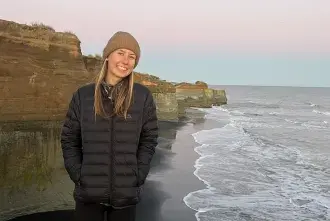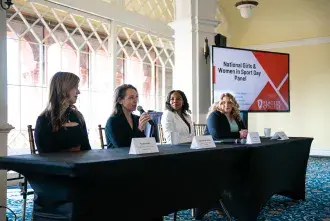

Dietz, a Digital Media Production major with a minor in advertising, was drawn to the “Global Issues and the Pulitzer Center” course due to her long-standing fascination with journalism. The class, taught by Tracy Eaton until his recent retirement after 17 years, further fueled her passion.
“I’ve always had a love for journalism, and honestly did consider transferring majors, but my real passion is into digital media production,” Dietz said. “I love that I can combine the art of videography and production with journalism to tell a story.”
As a Campus Consortium partner with the Pulitzer Center for Crisis Reporting, Flagler offers students like Dietz the chance to research and report on key global events and issues that interest them. The “Global Issues and the Pulitzer Center” course guides students in proposing, designing, and producing projects such as journalistic articles, data interactives, e-publications, photo essays, or documentaries.

Image credit: The Pulitzer Center
Each semester, one student in is awarded a prestigious $3000 reporting grant to produce their project as a Pulitzer Fellow, based on submitted proposals. Dietz’s compassion for homeless communities inspired her project proposal which was selected from among her classmates’ to receive the grant.
“I have been volunteering for homeless communities since the age of five,” Dietz said. “My family thought that it was important to understand how lucky I am to have all the things I grew up with, so we as a group would go to the local soup kitchen to cook and serve food to homeless people at least two times a week.”
Dietz’s project proposal for “Transforming Lives: Finland’s Innovative Approach to Homelessness,” delves into Finland’s successful implementation of the Housing First Initiative.
“Homelessness is one of the world's largest problems,” the introduction of her project summary reads. “There are an estimated 150 million people facing homelessness around the world. However, there is one country that may have found a way to eradicate this global problem.”
During her Flagler Sophomore High Impact Practice (FlagSHIP) course, “Unsheltered: Homeless and Voiceless in St. Augustine,” with Professor Sandra Gehring, Dietz volunteered extensively with Dining for Dignity, a ministry of Our Lady of Good Council Catholic Church. She also visited local organizations like St. Francis House and the Homeless Coalition. These experiences deepened her connection to the issue of homelessness.
“I had already had a perception of the homeless from volunteering with them before but it’s a lot different when you experience the homeless you see every day,” Dietz said. “Most of the individuals I interacted with were people I would pass walking to class or work.”
While investigating homelessness seemed like a natural choice for her Pulitzer project, Dietz initially considered various angles for her proposal, many of which were “shot down.”
“When things didn’t go my way, I found a different angle and kept trying until something stuck,” she said.
While waitressing one day, Dietz served Professor Gehring, and during their chat, she mentioned her struggle to nail down a topic for her Pulitzer class. Gehring suggested she look into homelessness in Finland and the country’s Housing First Initiative. That night, Dietz researched the topic and quickly chose it for her project, thanks to this serendipitous encounter.
Despite her passion for the subject, Dietz had no expectations of getting the Pulitzer Grant.
“If I am being honest, I really didn’t expect to get the grant, the competition was really tight, and everyone had a great presentation,” Dietz said. “I had shut off my phone for most of the day, so I didn’t see the email until I was headed to bed and actually thought I was reading the message wrong.”
But as it turned out, Dietz was indeed headed to Finland.
“I was very thankful but also shocked that they had chosen my idea,” she said.
Before arriving in Finland, Dietz did extensive research, watching YouTube videos from organizations like Y-Säätiö, Rinnekodit, and VVA ry, all involved in the Housing First Initiative. This preparation helped her establish initial contacts and laid the groundwork for her field research.
Her efforts paid off when one of her contacts invited her to the Global Homelessness Summit in Helsinki, perfectly aligning with her travel schedule. The summit opened new doors and connections.
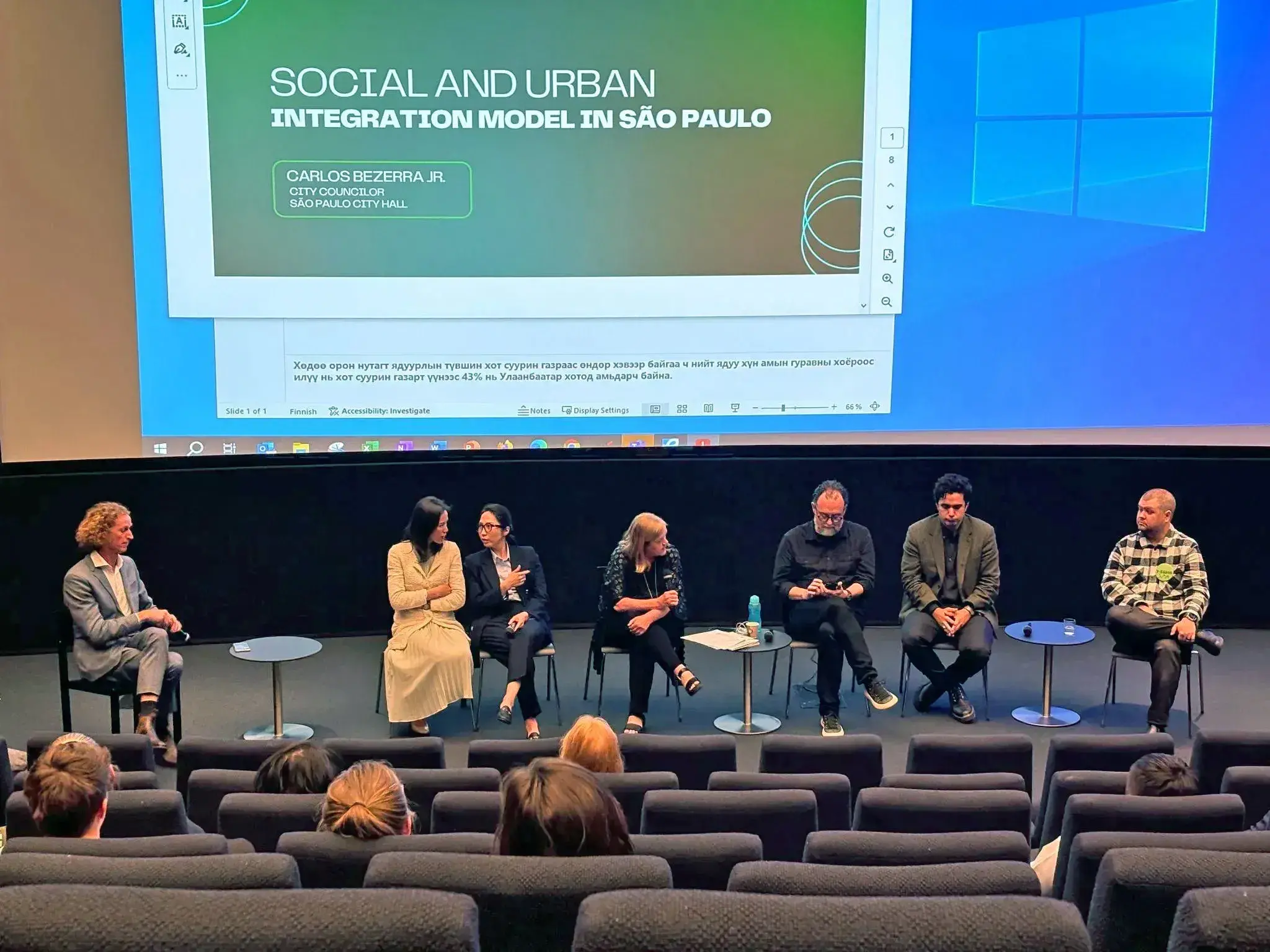
“Local to Global' homelessness summit panel- Image by Lilly Dietz, 2024.
Armed with her research and new contacts, Dietz visited housing complexes like Silta, observing the impact of the Housing First Initiative firsthand. She gathered insights from Marko Lahtela, head of Silta, who explained how government support helps tenants afford rent and fosters a supportive environment.
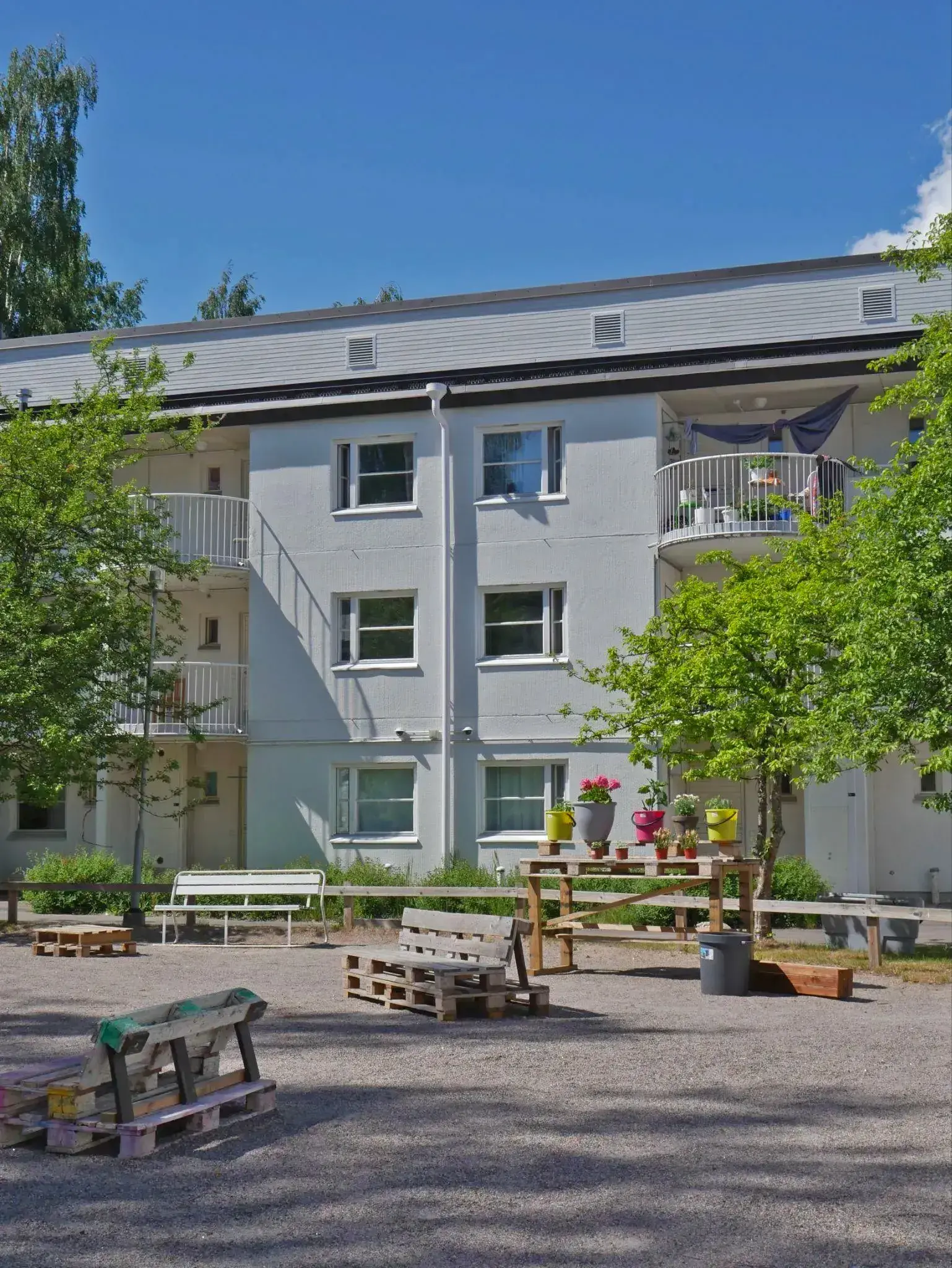
Silta’s community space- Photo by Lilly Dietz. Finland, 2024.
The trip went smoothly, thanks to the serendipitous timing and connections she made. However, Dietz discovered a different narrative than her pre-reporting research suggested. One of her sources, Jan Vapaavuori, former mayor of Helsinki, was skeptical about Helsinki reaching its goal of eradicating homelessness by 2025.
“When I began my interviews, I began to see just how different the article outcome was going to be,” she said.
Due to privacy rules, Dietz couldn’t conduct interviews with homeless people in Finland. She only had brief encounters with them, mostly at night. Instead of panhandling, she observed that many homeless individuals collect bottles and cans to exchange for money, noting their self-sufficiency.
“Most trash cans are left unlocked, or people will place their bottles to the side and that is so that the homeless can collect them,” she said. “Each item can give you anywhere from five to forty cents dispensing on what it is.”
Through her in-depth research and firsthand observations, Dietz concluded that while Finland’s Housing First Initiative has made significant strides in reducing homelessness, challenges remain.
“Organizations [like VVA ry] work together with city and national departments to make a difference, not only in targeting the stigma surrounding homelessness, but also eradicating the issue,” Dietz wrote. “However, Finland has had a stall in efforts to decrease homelessness, and the government has been blamed for it. Although the Finnish had put many efforts into programs in the beginning years, they are starting to decrease funding, as well as focus on other issues.”
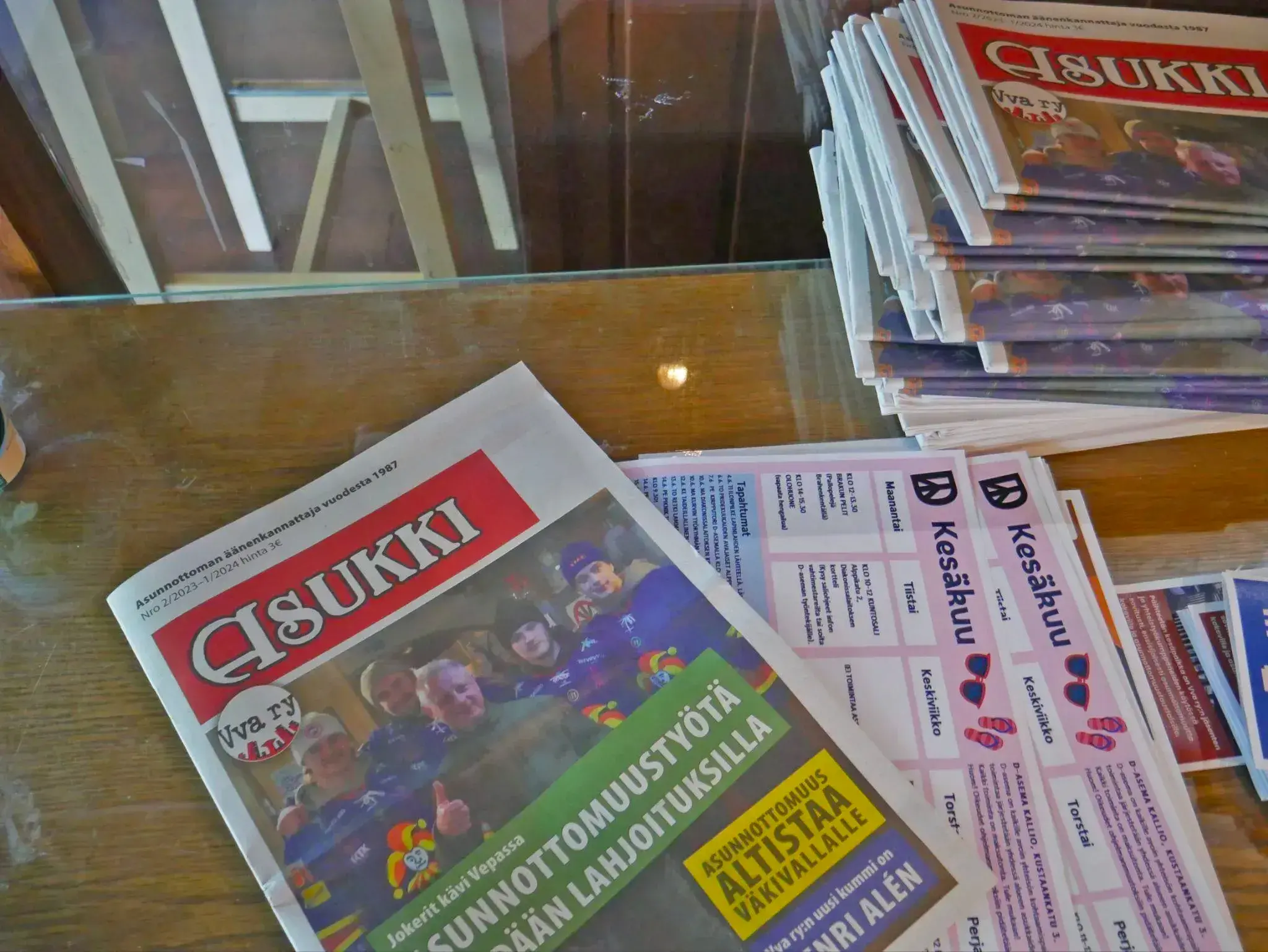
VVA ry’s newspaper, "Asukki " - Image by Lilly Dietz. Finland, 2024.
The skepticism expressed by former mayor Jan Vapaavuori about Helsinki’s ambitious goal of eradicating homelessness by 2025 highlights the complexities and ongoing efforts required to sustain such progress.
“I don’t see that the current administration is actually prioritizing that pursuit as much as we did,” the former mayor said. “... I'm skeptical .... about them reaching their goal, but I'm confident that they will still make some progress.”
Despite these challenges, Dietz’s Pulitzer reporting underscored invaluable lessons from the initiative’s focus on providing immediate, stable housing as a cornerstone for addressing broader issues, offering significant insights for global homelessness solutions.
Reflecting on her journey, Dietz credits her mentors for their invaluable support. She thanked WFCF Station Manager Dan McCook for inspiring her to view stories from different perspectives and acknowledged retired Professor Tracy Eaton for his guidance in perfecting her reporting plan. Most importantly, she credited Professor Gehring for steering her towards the Housing First topic.
“She knew my extensive background with homeless [communities] and steered me in the direction of Housing First because she knew I could really work with the narrative.”
Through her dedication and the support of her mentors, Dietz has crafted a narrative that bridges her passion for digital media production with impactful storytelling, offering valuable insights into global solutions for homelessness.
“Dietz’s project is a great example of the Pulitzer Center’s focus on underreported stories that need more attention,” Brian Thompson, the course’s new instructor, said. “This is one of the huge benefits of Flagler’s connection with the organization, as we have incredibly talented students looking for opportunities to tell impactful stories about issues that matter around the world.”
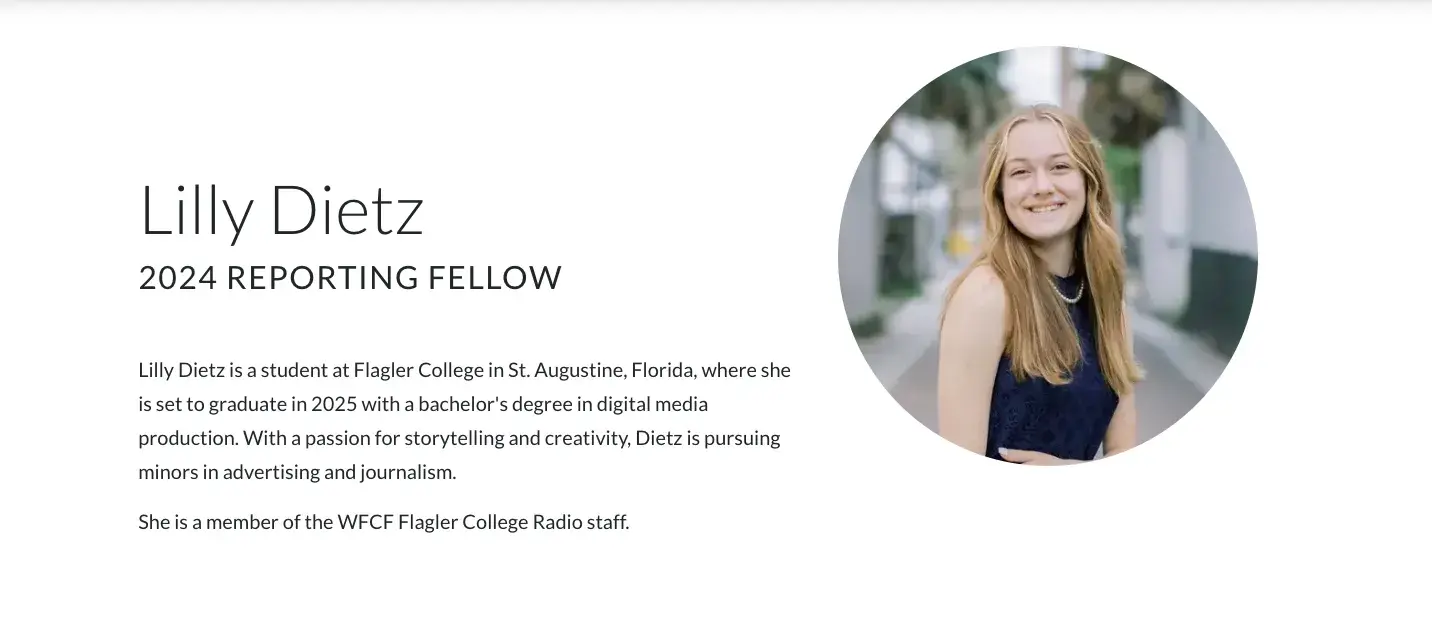
You can find Dietz’s Pulitzer Center project, “Transforming Lives: Finland’s Innovative Approach to Homelessness,” here.
